
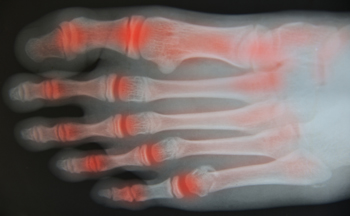
Arthritis, a chronic inflammatory condition, manifests its influence on the human body in various ways, and the feet and ankles often bear a significant brunt of its impact. The joints in these lower extremities, intricate in structure and essential for mobility, become vulnerable targets. Inflammatory arthritis types, such as rheumatoid arthritis, can result in painful swelling, stiffness, and joint deformities, limiting the range of motion. Osteoarthritis, characterized by the gradual breakdown of cartilage, leads to pain and reduced flexibility in the affected joints. The feet, comprising numerous small joints, are particularly susceptible, and the gradual progression of arthritis can affect the arches, toes, and ankle joints. As these joints endure wear and tear, daily activities can become increasingly challenging. Understanding the toll arthritis can take on the feet and ankles emphasizes the importance of early diagnosis, tailored treatments, and proactive measures. If you have arthritis and your feet and ankles are affected, it is strongly suggested that you consult a podiatrist who can help you to manage this condition.
Arthritis can be a difficult condition to live with. If you are seeking treatment, contact Dr. Edward D. Hutson from Easton, PA. . Our doctor can provide the care you need to keep you pain-free and on your feet.
Arthritic Foot Care
Arthritis is a joint disorder that involves the inflammation of different joints in your body, such as those in your feet. Arthritis is often caused by a degenerative joint disease and causes mild to severe pain in all affected areas. In addition to this, swelling and stiffness in the affected joints can also be a common symptom of arthritis.
In many cases, wearing ill-fitting shoes can worsen the effects and pain of arthritis. Wearing shoes that have a lower heel and extra room can help your feet feel more comfortable. In cases of rheumatoid arthritis, the arch in your foot may become problematic. Buying shoes with proper arch support that contour to your feet can help immensely.
Alleviating Arthritic Pain
It is best to see your doctor for the treatment that is right for your needs and symptoms. Conditions vary, and a podiatrist can help you determine the right method of care for your feet.
If you have any questions, please feel free to contact our offices located in Easton, and Northampton, PA . We offer the newest diagnostic tools and technology to treat your foot and ankle needs.
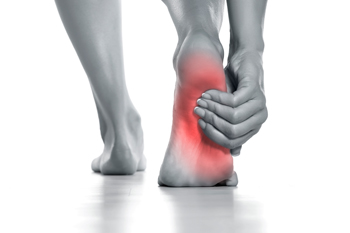
Many people have experienced foot pain from standing all day, either at work or at home. As it turns out, the floors installed around your house may be making the problem worse. Whether you are young or old, aches and pains can easily come from constantly being on your feet so any efforts made to decrease the discomfort can make all the difference in improving your physical and emotional well-being. These efforts begin with making your home as comfortable as possible, as the type of flooring you install can greatly impact your feet as you continue to go about your daily routines. Laminate, linoleum, vinyl, and carpet are just a few examples of floors offering physical benefits to homeowners who are all too familiar with the effects of minor and moderate foot pain. Selecting new floors for your home may seem challenging since each type comes with its own set of advantages and disadvantages. But doing so may help to improve existing foot pain. If you are considering changing the flooring in your home for relief from foot pain, it is suggested that you schedule an appointment with a podiatrist for specialized recommendations that would best suit your needs.
Foot Pain
Foot pain can be extremely painful and debilitating. If you have a foot pain, consult with Dr. Edward D. Hutson from Easton, PA. . Our doctor will assess your condition and provide you with quality foot and ankle treatment.
Causes
Foot pain is a very broad condition that could be caused by one or more ailments. The most common include:
Diagnosis
To figure out the cause of foot pain, podiatrists utilize several different methods. This can range from simple visual inspections and sensation tests to X-rays and MRI scans. Prior medical history, family medical history, and any recent physical traumatic events will all be taken into consideration for a proper diagnosis.
Treatment
Treatment depends upon the cause of the foot pain. Whether it is resting, staying off the foot, or having surgery; podiatrists have a number of treatment options available for foot pain.
If you have any questions, please feel free to contact our offices located in Easton, and Northampton, PA . We offer the newest diagnostic and treatment technologies for all your foot care needs.
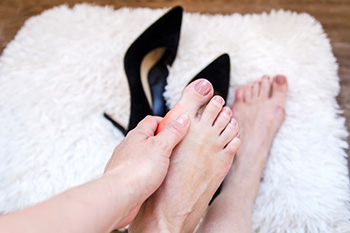
A recent study shows that nearly 40 percent of women wear high heels every day. However, this fashion choice comes at a cost, with 75 percent of these women reporting regular foot pain and various foot deformities. The narrow toe box inherent in most high-heeled shoes is believed to be the main cause. This constrictive design makes it challenging for women to comfortably fit their entire foot into the shoe, leading to toe deformities, such as bunions, hammertoes, and calluses. While heredity plays a large role in the formation of a bunion, external pressure from shoes with a small toe box can make it worse. When conservative measures fail, surgery may be necessary to realign the joint and distribute weight more evenly across the foot. High heels also bend the toes upward, exposing more bone to the bottom of the shoes and causing significant pain. Additionally, the frequent use of high heels is linked to tight calf muscles, which pave the way for other painful foot problems like plantar fasciitis, flat feet, and Achilles tendonitis. For help with any of the above mentioned foot problems, it is suggested that you schedule an appointment with a podiatrist for an exam and treatment options.
High heels have a history of causing foot and ankle problems. If you have any concerns about your feet or ankles, contact Dr. Edward D. Hutson from Easton, PA. . Our doctor can provide the care you need to keep you pain-free and on your feet.
Effects of High Heels on the Feet
High heels are popular shoes among women because of their many styles and societal appeal. Despite this, high heels can still cause many health problems if worn too frequently.
Which Parts of My Body Will Be Affected by High Heels?
What Kinds of Foot Problems Can Develop from Wearing High Heels?
How Can I Still Wear High Heels and Maintain Foot Health?
If you want to wear high heeled shoes, make sure that you are not wearing them every day, as this will help prevent long term physical problems. Try wearing thicker heels as opposed to stilettos to distribute weight more evenly across the feet. Always make sure you are wearing the proper shoes for the right occasion, such as sneakers for exercising. If you walk to work, try carrying your heels with you and changing into them once you arrive at work. Adding inserts to your heels can help cushion your feet and absorb shock. Full foot inserts or metatarsal pads are available.
If you have any questions please feel free to contact our offices located in Easton, and Northampton, PA . We offer the newest diagnostic and treatment technologies for all your foot and ankle needs.
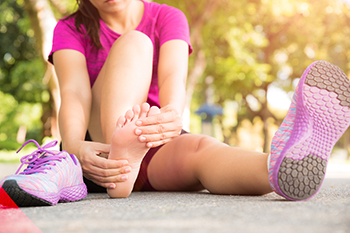
Pinky toe pain, though often perceived as a minor inconvenience, can stem from various factors, warranting attention to ensure optimal foot health. One prevalent cause is wearing ill-fitting footwear, particularly shoes that cramp the toes or have a narrow toe box. This type of shoe compresses the pinky toe, leading to discomfort and potential issues such as corns or calluses. Additionally, trauma or injury, such as stubbing the toe or dropping a heavy object on it, can induce pain and swelling in the pinky toe. Additionally, structural anomalies, like bunions or hammertoes, may contribute to misalignment, affecting the pinky toe's position and causing pain. Ingrown toenails, resulting from improper nail trimming or tight shoes, can also lead to discomfort and inflammation. Addressing pinky toe pain necessitates identifying the underlying cause, whether it be related to footwear, injury, or structural issues. If you have developed pain in your pinky toe, it is suggested that you visit a podiatrist who can determine what the cause is, and offer appropriate treatment options.
Toe pain can disrupt your daily activities. If you have any concerns, contact Dr. Edward D. Hutson of Easton, PA. . Our doctor can provide the care you need to keep you pain-free and on your feet.
What Causes Toe Pain?
Most severe toe pain is caused due to a sports injury, trauma from dropping something heavy on the toe, or bumping into something rigid. Other problems can develop over time for various reasons.
Toe pain can be caused by one or more ailments. The most common include:
When to See a Podiatrist
Diagnosis
In many cases the cause of toe pain is obvious, but in others, a podiatrist may want to use more advanced methods to determine the problem. These can range from simple visual inspections and sensation tests to X-rays and MRI scans. Prior medical history, family medical history, and any recent physical traumatic events will all be taken into consideration for a proper diagnosis.
Treatment
Treatments for toe pain and injuries vary and may include shoe inserts, padding, taping, medicines, injections, and in some cases, surgery. If you believe that you have broken a toe, please see a podiatrist as soon as possible.
If you have any questions please feel free to contact our offices located in Easton, and Northampton, PA . We offer the newest diagnostic tools and technology to treat your foot and ankle needs.
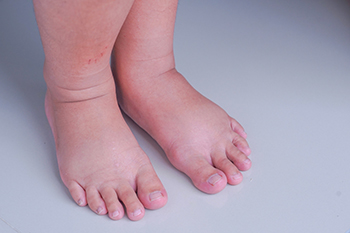
Lymphoedema is a condition where the legs or feet swell due to fluid buildup because the body's lymphatic system, which functions similarly to veins, is struggling to remove it. This swelling is called edema and can happen when you do not move enough, such as after sitting for long periods during a flight. Persistent swelling of the feet, swelling that lasts over three months, is known as chronic edema, which suggests the beginning of lymphatic failure or early lymphoedema. If left untreated, chronic foot edema can cause skin changes, deeper tissue damage, and increase the risk of infections such as cellulitis. It is often associated with chronic venous insufficiency. Various factors can contribute to lymphoedema, including genetics, obesity, inactivity, vein problems, or damage from cancer treatments. Joint surgery may also impair lymphatic vessels, leading to lymphoedema. If you are experiencing swollen feet on a regular basis, it is suggested that you make an appointment with a podiatrist as quickly as possible to obtain treatment and prevent serious complications.
Swollen feet can be a sign of an underlying condition. If you have any concerns, contact Dr. Edward D. Hutson of Easton, PA. . Our doctor can provide the care you need to keep you pain-free and on your feet.
Swollen feet are a common ailment among pregnant women and people who stand or sit for extended periods. Aging may increase the possibility of swollen feet and patients who are obese often notice when their feet are swelling too. There may be medical reasons why swollen feet occur:
Swollen feet can also be caused by bone and tendon conditions, including fractures, arthritis, and tendinitis. Additionally, there may be skin and toenail conditions and an infection may cause the feet to swell. Patients who take medicine to treat high blood pressure may be prone to getting swollen feet.
Many patients elevate their feet to help relieve the swelling and this is generally a temporary remedy. When a podiatrist is consulted the reason behind the swelling can be uncovered and subsequently treated.
If you have any questions please feel free to contact our offices located in Easton, and Northampton, PA . We offer the newest diagnostic tools and technology to treat your foot and ankle needs.